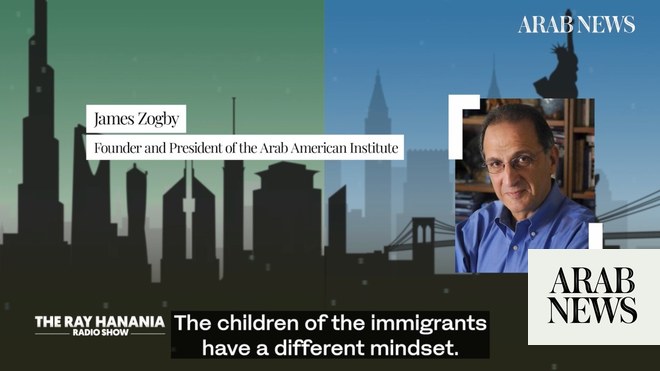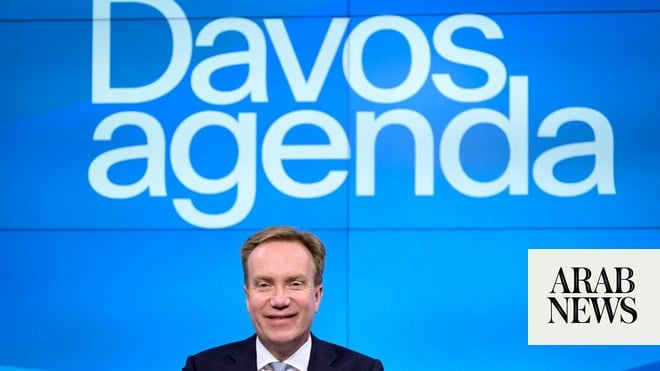
Focus on more delegates, says AAI President James Zogby
New generation seeks inclusivity, not ‘stuck’ in Mideast politics
CHICAGO: Arab Americans are already planning to have a strong presence at next year’s Presidential Democratic National Convention, seeking to replicate and even exceed past achievements.
James Zogby, founder and president of the Arab American Institute, or AAI, based in Washington D.C., said that while the community continues to face challenges overcoming discrimination and exclusion in American politics, it also continues to advance electing more Arabs to public office.
During an interview on The Ray Hanania Radio Show Wednesday, on the US Arab Radio Network sponsored by Arab News, Zogby said a younger generation of Arab Americans, who are moving away from the divisive politics of their parents’ homelands, would help strengthen their political empowerment. He added that “you get a very different mindset” from the younger generation here in America.
“The children of the immigrants have a different mindset. The children of the immigrants, when they take the lead, they find common ground rather than the divisions of their folks — (whose) feet are here but their heads are back home, as they say. What we find today is something of the same thing. The younger kids have a broader sense of being part of a community and look for common ground of issues of concern that are shared. And that is where we will go,” Zogby said, noting that younger Arab Americans do not get “stuck” in Middle East politics which pit various factions, movements and governments against each other.
“But when you deal with the generation of young Syrian-Lebanese, Palestinian, Egyptian American kids here, or the ones who are not so much kids but are focused on America and American politics, you get a very different mindset. I don’t think it will be that difficult. I think they want to get involved and they want to be a part of the process. And we will do our darndest to facilitate it. We have not in any convention since that ’88 one, we have never exceeded 80 (delegates) but we have always hovered around 50. I am sure we will have our component of a reasonable number of delegates because young people are running. They care about it and they want to be involved in the process. They did last time and they will do it again.”
Zogby said Arab American influence in presidential elections was strengthened in 1984 when the Rev. Jesse L. Jackson reached out to the community asking them to support his candidacy for president. Jackson, he said, “inspired” the Arab American political movement.
“We had never been involved in a presidential campaign before. There had been Syrians for Carter. Lebanese for Reagan. But there had never been an Arab American effort. And even in ’84 after the Jackson campaign, when a group of Arab Americans gave money to (US Senator Walter) Mondale, he (Mondale) gave the money back. They were very well known. They were St. Jude’s folks. Most of them from this group from Chicago. They were on the St. Jude’s board. But he was told to give the money back and he did. It was heartbreaking to them and infuriating for us,” said Zogby, who Jackson named as a deputy campaign manager for his presidential campaign.
“People turned out in record numbers to rallies and do all that stuff and they were excited that he was there talking to them, talking about them, mentioning the Arab American community’s name.”
Jackson did not win the Democratic Party nomination but Mondale, who won, lost in the November 1984 general election to then-President Ronald Reagan who went on to a second term.
Despite the loss, Zogby’s involvement in the Jackson campaign inspired him and others to launch the AAI in 1985 and to organize in anticipation of the next presidential election campaign in 1988. Democratic nominee Michael A. Dukakis lost his bid to Reagan’s successor, George H.W. Bush.
Zogby said Arab Americans elected a record 80 delegates to the Democratic Presidential Convention held in Atlanta in 1988.
“We decided that what we will do is we will continue what we did in 1984 and make it into a focused organization. Voter registration. Mobilizing the vote. Getting candidates, Arab Americans to run and being involved in public service and bringing our issue into the political mainstream. So, we did. We launched the (AAI) in 1985. We had one of our founding meetings in Chicago with our eye towards ’88 and how we were going to mobilize Arab Americans before ’88,” Zogby said.
“Well, we got sidetracked because the mayor of Dearborn ran on a platform of what to do with the ‘Arab problem.’ They are not like us. They don’t share our values. And they are ruining our darn good way of life. So, we focused on Dearborn voter registration and it turned out quite successful.”
Zogby added: “But by the time we got to ’88, we had an idea and that was to focus not only on mobilizing the community and getting them to run for delegate and win, but also to bring our issues into the Democratic state conventions. And we passed pro-Palestinian statehood resolutions in 10 states. We had part of the Jackson platform, at the national convention. And we actually had the first-ever national debate on Palestine from the podium of the convention as I introduced the Minority Plank on Palestine at the convention. But more important to me, was that we had 80-plus Arab American delegates. The previous high had been four. We were now at 80. And that was how successful our efforts were to get people to run.”
Since then, the Arab community has elected an average of 40 to 50 delegates at subsequent conventions where they have advocated for pro-Arab policies on the Democratic Platform including supporting a Palestinian state in 1988 and again in 2016. The conventions have also featured Arab American cultural events to raise awareness of Arab American concerns, from advocating for Palestine to fighting bigotry.
In 1995, Zogby was appointed as co-convener of the National Democratic Ethnic Coordinating Committee, or NDECC, an umbrella organization bringing together European and Middle Eastern Americans. And, Zogby has served in various positions with many presidential candidates including former Vice President Al Gore and US Senator Bernie Sanders.
When the Democratic Presidential Convention comes to Chicago Aug. 19 through Aug. 22, 2024, Zogby said the AAI will work with Arab Americans to host a festival showcasing all of the city’s various ethnic groups including Arab American culture and leadership.
“So, what we are planning for next year’s convention is a ‘Taste of Chicago Ethnic Fair’ where we are going to advertise: here’s the Polish restaurant, and the Irish restaurants and the Arab restaurants, and the Italian restaurants, and create a sense that the ethnic communities of Chicago have a real role to play in the (Democratic) party,” Zogby said, citing Chicago’s history as being one of the nation’s most ethnically diverse cities.
Zogby said the cultural event would help 2024 Democratic Convention delegates recognize the unique cultural and ethnic heritage of Chicago “and the Arab community will be a key part of that. We will try to do an event in the heart of the Arab community” making Arabs “a part of the bigger ethnic identity carrying them through the convention.”
He predicted it would not be difficult to replicate at the 2024 Democratic National Convention the achievements Arab Americans made during past conventions.
The Ray Hanania Radio Show is broadcast every Wednesday in Detroit on WNZK AM 690 and Washington D.C. on WDMV AM 700 radio on the US Arab Radio Network and sponsored by Arab News.
You can listen to the radio show’s podcast by visiting ArabNews.com/rayradioshow.












